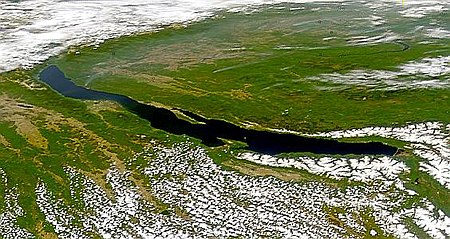Lake Baikal: Difference between revisions
Jump to navigation
Jump to search

George Swan (talk | contribs) (first draft) |
George Swan (talk | contribs) (copy editing) |
||
| Line 1: | Line 1: | ||
{{subpages}} | {{subpages}} | ||
[[File:Baikal-S1998162044804.jpg | thumb | 450px | satellite photo of Lake Baikal]] | [[File:Baikal-S1998162044804.jpg | thumb | 450px | satellite photo of Lake Baikal]] | ||
'''Lake Baikal''' is a large lake in an isolated region in [[Siberia]].<ref name=LimnologyUWisc/> It drains into the [[Yenisei River]]. It is the world's deepest lake and it is the largest lake, by volume, although other lakes, like [[Lake Superior]], have greater surface areas. | '''Lake Baikal''' is a large lake in an isolated region in [[Siberia]].<ref name=LimnologyUWisc/> It drains into the [[Yenisei River]]. It is the world's deepest lake and it is the largest freshwater lake, by volume, although other lakes, like [[Lake Superior]], have greater surface areas. | ||
==References== | ==References== | ||
Latest revision as of 00:31, 14 February 2024
Lake Baikal is a large lake in an isolated region in Siberia.[1] It drains into the Yenisei River. It is the world's deepest lake and it is the largest freshwater lake, by volume, although other lakes, like Lake Superior, have greater surface areas.
References
- ↑ Water We Talking About? The Greatest Lake(s)], University of Wisconsin, 2020-08-28. Retrieved on 2024-02-14. “If you are talking about the lake with that holds the most water, then you need to head to a place in Russia just north of its border with Mongolia, where the crystal-clear waters of Lake Baikal plunge down more than a mile to a lake floor formed at the intersection of two continental plates.”
